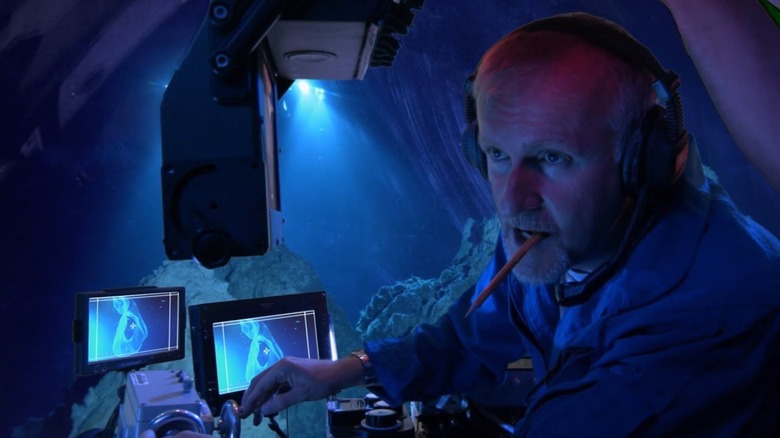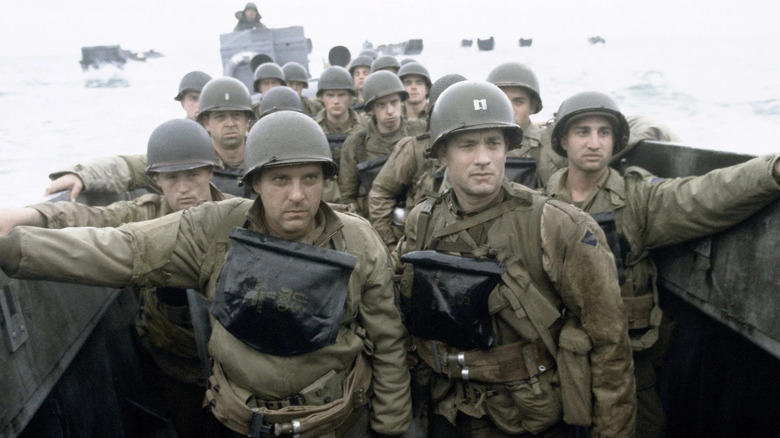James Cameron Is Taking An Important Cue From Steven Spielberg For His Atomic Bomb Drama
Back in September of 2024, /Film reported that James Cameron was starting production on a new film called "The Last Train From Hiroshima," based on the Charles R. Pellegrino book of the same name, as well as Pellegrino's forthcoming follow-up "Ghosts of Hiroshima." This announcement was startling, as Cameron has said that he would — and so far has — work exclusively on "Avatar" films for the remainder of his directorial career. "Avatar: Fire and Ash," his third "Avatar" picture, is due out in theaters on December 19, 2025, and he fully intends to make a Part 4 (currently slated for 2029).
"The Last Train From Hiroshima" is, as the title implies, an historical novel told mostly from the perspective of the real-life Tsutomu Yamaguchi, one of the only people who have survived both the nuclear bomb explosion on Hiroshima on August 6, 1945, and also the nuclear bomb explosion in Nagasaki on the 9th. The book covers the events leading up to the bomb, the actual events of the days of destruction, and the immediate aftermath. Pellegrino's first book came under some fire for lies about accreditation and the inclusion of testimonies that may not be true, but Cameron wanted to tell the story anyway, having met Yamaguchi only days before his death in 2010.
According to a new report from Deadline, Cameron has been thinking about "Last Train" a lot, even going so far as to consult with another noted blockbuster filmmaker, Steven Spielberg, about how one handles this kind of material. To date, most of Cameron's films have been fantasy or sci-fi movies, "Titanic" being the one notable exception. Spielberg also spent most of his career making sci-fi and fantasy movies while also periodically turning to historical dramas, so he was a good director to seek words of advice from.
Spielberg said that it was a filmmaker's responsibility to make their film as intense as possible.
Spielberg advised Cameron to make his Hiroshima movie as intense as possible
Cameron is a very politically conscious (if not exactly subtle) filmmaker, and most of his films have underpinnings of environmentalism ("Avatar"), class divides ("Titanic"), dangerous technologies ("The Terminator"), or military hubris ("Aliens"). He clearly wants his Hiroshima/Nagasaki film to be as well-constructed as his previous films, but also to shake audiences as far as he can out of their complacency. For theories on how to do that, he recalled a conversation he had with Spielberg, who advised the following:
"I want to do for what happened at Hiroshima and Nagasaki, what Steven Spielberg did with the Holocaust and D-Day with 'Saving Private Ryan.' He showed it the way it happened. He and I talked about this, and he shared this with me: when he was making that film, notwithstanding whatever the studio wanted from it, he said, 'I'm going to make it as intense as I can make it, because my limitation as any filmmaker' — and he's the best out there — 'is that I can't make it as intense as it really was.' That was an object lesson."
Cameron continued:
"You've got to use everything at your cinematic disposal to show people what happened. We all love our horror movies, and horror movies love to outdo each other. This is true horror, because it happened."
Cameron, using every tool in the cinematic toolbox, all in service of a horror movie about the real-life nuclear terrors of Hiroshima and Nagasaki, sounds like a dangerous animal indeed. Cameron is the champion of a certain kind of pop Hollywood filmmaking, and if he chooses to focus on something terrifying, then he will indeed be successful. Cameron said elsewhere in the Deadline interview that he will eschew politics and ignore combat details. He wants a "you-are-there" experience of the atomic bomb.
He will begin on the film, one can presume, as soon as a window opens in his "Avatar" schedule.

